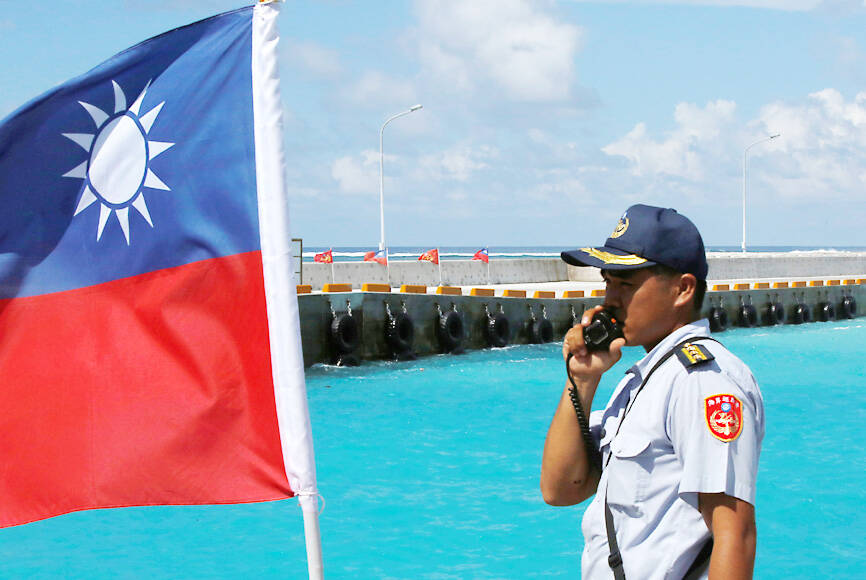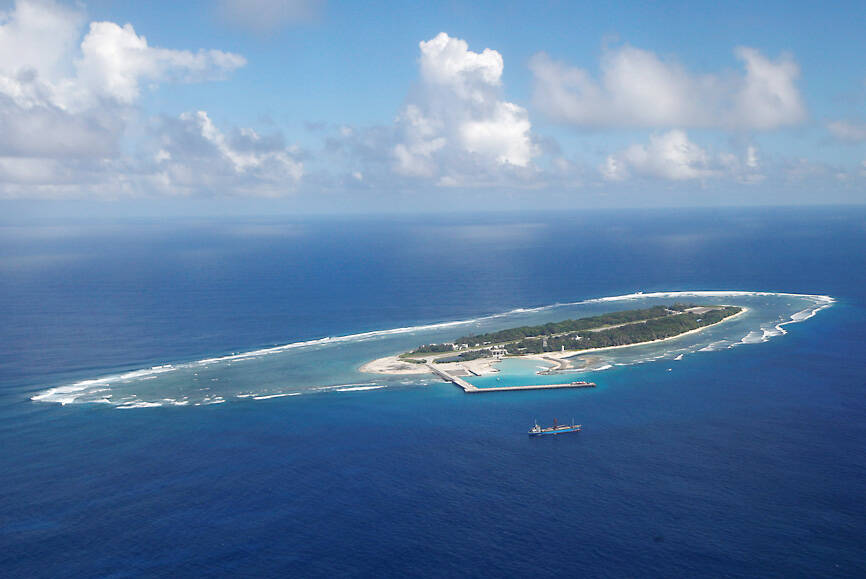The Coast Guard Administration has failed to prevent service members garrisoned on Itu Aba Island (Taiping Island, 太平島) from using a Chinese cellular network to call home in a national security breach, the Taiwan Statebuilding Party said yesterday.
The party received an anonymous tip that coast guard personnel on Itu Aba routinely connected to Chinese cell towers due to poor reception from Taiwanese networks, Taiwan Statebuilding Party Kaohsiung chapter executive Yang Pei-hua (楊佩樺) told a news conference in Taipei.
Using the signal provided by a hostile power is a breach of national security, as China can find the location of devices connected to its networks and intercept communications between them, Yang said.

Photo: J.R Wu, Reuters
Beijing has likely made its 4G network available to local Taiwanese devices to spy on the nation’s service members, she said.
The party went public with the information not to start a blame game, but in the hope that the authorities would be prompted to address the vulnerability and improve cell service on the islet, she said.
In 2018, the National Communications Commission (NCC) praised Chunghwa Telecom (中華電信) for successfully implementing a NT$30 million (US$938,262) project to extend its 4G coverage to Itu Aba after dispatching a mission of senior officials to tour the islet, said Lin Yi-ping (林意評), convener of the party’s Yilan County chapter.

Photo: Fabian Hamacher, Reuters
However, Chunghwa Telecom’s Web site indicated that only 2G services are available on Itu Aba, which does not line up with the pronouncements the commission made five years ago, Lin said.
The use of “enemy cell towers” by Taiwan’s defenders of Itu Aba is a grave security breach that might reduce the nation’s creditability in the eyes of its allies, Taiwan Statebuilding Party Chairman Wang Hsing-huan (王興煥) said.
The authorities must address the problem immediately or the country might as well lease Itu Aba to the US’ armed forces, which certainly would not compromise the security of the South China Sea for a cellphone signal, Wang said.
The Coast Guard Administration and the commission separately said that the islet’s telecommunications satellite coverage was not satisfactory, but added that improvements would be be made soon.
The coast guard said in a statement that safe and secure 4G telecommunications have been available to its bases on the Pratas Islands (Dongsha Islands, 東沙群島) and the Spratlys (Nansha Islands, 南沙群島), including Itu Aba, since the middle of 2017.
A Mitsubishi Electric-made ST2 satellite is the main enabler of 4G phone and Internet services on those islands, it said.
Internet, texting and image-sending speeds are slower for civilian users due to the need to prioritize secure military communications over limited satellite bandwidth, it said.
The coast guard is working with the Ministry of Digital Affairs, the NCC and Chunghwa Telecom to improve telecommunication services at the bases, it added.
NCC Vice Chairman Wong Po-tsung (翁柏宗) said that the ST-2 satellite’s 4G capabilities are mostly used to convey essential military and government communications, leaving limited bandwidth for other users.
This means the network can handle voice calls efficiently, but not much more, Wong said, adding that China is known to operate towers within range of Itu Aba.
The ministry has been working to secure telecom services from OneWeb and Starlink since August last year, he said, adding that a deal could be struck by the end of this year at the earliest.
Itu Aba is too far from Taiwan proper for microwave boosters to be of use, leaving satellites the only viable option for high-speed Internet and phone services, he said.
Beijing operates a large constellation of communications satellites, which gives it a significant edge in the reach and speed of its telecommunications, he said.

DAREDEVIL: Honnold said it had always been a dream of his to climb Taipei 101, while a Netflix producer said the skyscraper was ‘a real icon of this country’ US climber Alex Honnold yesterday took on Taiwan’s tallest building, becoming the first person to scale Taipei 101 without a rope, harness or safety net. Hundreds of spectators gathered at the base of the 101-story skyscraper to watch Honnold, 40, embark on his daredevil feat, which was also broadcast live on Netflix. Dressed in a red T-shirt and yellow custom-made climbing shoes, Honnold swiftly moved up the southeast face of the glass and steel building. At one point, he stepped onto a platform midway up to wave down at fans and onlookers who were taking photos. People watching from inside

A Vietnamese migrant worker yesterday won NT$12 million (US$379,627) on a Lunar New Year scratch card in Kaohsiung as part of Taiwan Lottery Co’s (台灣彩券) “NT$12 Million Grand Fortune” (1200萬大吉利) game. The man was the first top-prize winner of the new game launched on Jan. 6 to mark the Lunar New Year. Three Vietnamese migrant workers visited a Taiwan Lottery shop on Xinyue Street in Kaohsiung’s Gangshan District (崗山), a store representative said. The player bought multiple tickets and, after winning nothing, held the final lottery ticket in one hand and rubbed the store’s statue of the Maitreya Buddha’s belly with the other,

‘NATO-PLUS’: ‘Our strategic partners in the Indo-Pacific are facing increasing aggression by the Chinese Communist Party,’ US Representative Rob Wittman said The US House of Representatives on Monday released its version of the Consolidated Appropriations Act, which includes US$1.15 billion to support security cooperation with Taiwan. The omnibus act, covering US$1.2 trillion of spending, allocates US$1 billion for the Taiwan Security Cooperation Initiative, as well as US$150 million for the replacement of defense articles and reimbursement of defense services provided to Taiwan. The fund allocations were based on the US National Defense Authorization Act for fiscal 2026 that was passed by the US Congress last month and authorized up to US$1 billion to the US Defense Security Cooperation Agency in support of the

HIGH-TECH DEAL: Chipmakers that expand in the US would be able to import up to 2.5 times their new capacity with no extra tariffs during an approved construction period Taiwan aims to build a “democratic” high-tech supply chain with the US and form a strategic artificial intelligence (AI) partnership under the new tariffs deal it sealed with Washington last week, Taipei’s top negotiator in the talks said yesterday. US President Donald Trump has pushed Taiwan, a major producer of semiconductors which runs a large trade surplus with the US, to invest more in the US, specifically in chips that power AI. Under the terms of the long-negotiated deal, chipmakers such as Taiwan Semiconductor Manufacturing Co (TSMC, 台積電) that expand US production would incur a lower tariff on semiconductors or related manufacturing